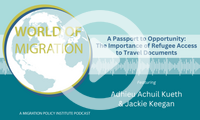Multimedia
In this webinar, experts discuss barriers immigrant and LEP individuals face in accessing the WIA system, how a revitalized WIA could address these barriers, and the extent to which the current Senate Health, Education, Labor, and Pensions (HELP) Committee's WIA reauthorization proposal addresses these barriers.
With the ten year anniversary of the September 11, 2001 attacks approaching, the Migration Policy Institute held a conference call to discuss the most significant changes that have occurred in the immigration arena in the decade since the attacks.
Proactive Engagement: Two Strategies for Providing Language Access in Workforce Development Services
This interactive language access webinar, one in a series offered by the Migration Policy Institute's National Center on Immigrant Integration Policy, examines how New York and Illinois have broken down some of these barriers to proactively engage LEP communities to obtain workforce services.
This Migration Policy Institute webinar discusses labor enforcement laws during the Clinton, Bush and Obama administrations and chronicles gaps in labor protection.
This webinar examines the E-Verify system, offering short- and long-term recommendations for improving gaps in employment verification and addressing an "employer-centric" design that exacerbates existing problems.












